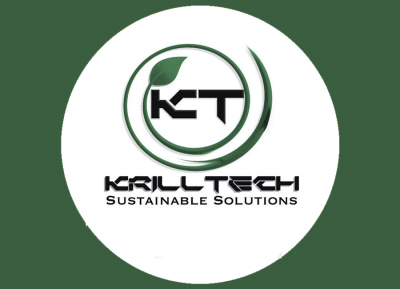 Using nanotechnology to solve important human problems has for many years been a personal goal of Marcelo Oliveira Rodrigues, a professor at the University of Brasília (UnB) and a partner at Krilltech. One of these problems is undoubtedly the problem of food production. Data from the UN and FAO show that food demand will grow by more than 50% by 2050, while the expansion of areas available for agriculture will not keep pace with this growth.
Using nanotechnology to solve important human problems has for many years been a personal goal of Marcelo Oliveira Rodrigues, a professor at the University of Brasília (UnB) and a partner at Krilltech. One of these problems is undoubtedly the problem of food production. Data from the UN and FAO show that food demand will grow by more than 50% by 2050, while the expansion of areas available for agriculture will not keep pace with this growth.
Krilltech was launched on the market this year as the culmination of seven years of research, development and testing. The startup will soon be able to make its contribution, through nanotechnology, to a more productive and ecologically correct agriculture, which produces foods with better nutritional quality. “Our technology is a revolution in the modes of production and the way in which sustainable agriculture is done,” says Rodrigues.
In addition to some projects under development, the startup already has a portfolio of products, which includes a line adaptable to customer needs. The products can be applied to the soil or leaves of plants, or even in water, in the case of hydroponic crops. Krilltech products increase the photosynthesis rates of cultivated plants, make their water consumption more efficient and accelerate their metabolism (biostimulants). At the same time, they act as fertilizers to provide micro and macro nutrients that are necessary for plant growth (nitrogen, carbon, phosphorus, potassium, and others). “Our nanoproducts are multifunctional,” says Rodrigues. The startup also has a product line to incorporate mineral salts such as zinc and iron into grains and vegetables. “Producing potatoes, corn, lentils and chickpeas enriched with iron and zinc will contribute to resolving public health problems associated with the deficiency of essential minerals,” exemplifies the professor – researcher – entrepreneur.
Because they are based on nanotechnology, these biostimulants–fertilizers overcome the limitations of conventional technologies and are able to deliver much more nutrients to the crops. “Stabilizing in aqueous media all macro and micronutrients in a solution requires a high surface area and extremely hydrophilic material. Without nanotechnology this is an extremely difficult task,” explains Rodrigues.
According to him, Krilltech’s products do not affect the biota of soils and bodies of water, they do not accumulate in plant tissues (they are metabolized), and are not toxic to fungi, bacteria and animals. In order to guarantee the non-toxicity of its products, Krilltech counts on results of tests carried out with larvae, worms, fungi, bacteria, fish, several lineages of healthy and tumor cells and mice.
As for Krilltech’s production processes, they are of relatively low costs, partly due to the lean system adopted by the startup, based on leveling production according to demand and focusing on increasing efficiency and avoiding waste in production processes. “We work with sophisticated products, but production processes are efficient and we do not need imported equipment for our production,” says Rodrigues. In addition, Krilltech does not use toxic reagents in its processes and does not generate waste, says Rodrigues.
With these characteristics of its technology, production processes and products, Krilltech wants to gain a place in the growing biostimulant market, currently dominated by multinational companies headquartered mainly in Europe, North America and India. According to estimates reported by Krilltech, the demand for biostimulants will increase mainly in Asia and South America. It is estimated that this market will move around US$ 3.5 billion in 2022.
Emergence of the startup: a partnership between an university and a state-owned research corporation

“Transforming scientific research into technologies absorbed by the consumer market has always been a personal desire,” says Professor Rodrigues. So in 2012, shortly after joining UnB as an adjunct professor, he identified projects from his research group that had the potential to become innovations. By 2016, the group had developed a nanoformulation based on a high-cost drug, used in the Brazilian public system to treat fungal infections. “We were able to reduce the toxicity and cost of the drug by about 40 percent, but we were frustrated by the lack of resources to advance pre-clinical studies according to the Brazilian health regulatory agency standards,” says Rodrigues.
Also in 2016, the group began discussions with a unit of the Brazilian Agricultural Research Corporation, Embrapa. Initially, the goal was the development of plastics with special optical properties for use in protected cultivation (greenhouse and similar). “The conversations with Dr. Juscimar Silva (Embrapa) have evolved toward the development of our nanobiostimulants,” says Rodrigues.
The laboratory development of the technology was carried out at UnB, with the participation of undergraduate and graduate students, and with the support of the Brazilian government agencies FAP-DF, CNPq and Capes through scholarships and resources for consumables. “Public funding was essential for the early stages of development,” emphasizes Rodrigues. With support from Embrapa, the technology was tested on tomato, pepper and lettuce. “We are currently evaluating our products in the large monocultures of the country in partnership with national and multinational companies,” says the partner of Krilltech.
In 2018, the startup entered the pre-incubation program of the Technological Development Support Center (CDT) of UnB, which aims to assist in the development of the business model and the formalization of the future company.
Currently, Krilltech, together with UnB and Embrapa, is in the final stage of filing the patent application for the technology used in the products. “Krilltech has the exclusive right to exploit the technologies,” states Rodrigues.
Confident in the high performance of its products and agility in the development of innovations, Krilltech already has new partners and new projects. The startup has a partnership to enable hops culture in the center of Brasil. Also, Krilltech is testing its technology in microgravity conditions to contribute to farming projects outside the planet Earth (space farming). In addition, Rodrigues adds, a second startup will soon be created to explore nanobiopesticides of very low toxicity developed by the group.
See our brief interview with Rodrigues, PhD in Chemistry (2010) from the Brazilian Federal University of Pernambuco.
B-MRS Newsletter: What were the most important factors in enabling the creation and development of the startup?
Marcelo Oliveira Rodrigues: Undoubtedly, the support offered by UnB, the Brazilian Ministry of Science, Technology, Innovation and Communication and EMBRAPA in terms of technology protections, consulting and training were fundamental to the creation of Krilltech. However, I would like to emphasize that the crisis which Brazilian science has been subjected to and the difficulties of entering into cooperation agreements between the University and the private sector were two factors that contributed greatly to initiate this undertaking.
B-MRS Newsletter: What were the main difficulties the startup has faced thus far?
Marcelo Oliveira Rodrigues: Leaving the comfort zone implies difficulties that need to be overcome. Learning to undertake this endeavor required a cultural change in the way we planned and developed our projects; I think that was the great difficulty we have overcome.
B-MRS Newsletter: What, in your opinion, is the startup’s main contribution to society?
Marcelo Oliveira Rodrigues: Our technology contributes to reduce the environmental impact caused by the application of conventional fertilizers. For example, when fertilizer phosphorus and nitrogen are improperly leached to rivers, lakes and oceans, they can induce the formation of dead-zones, as the eutrophication process can induce excessive growth of algae that depletes water oxygen.
Unlike conventional nanomaterials (metal nanoparticles and metal oxides, polymer micelles, etc.), our technology enables the use of nanotechnology in agriculture. Krilltech has contributed to reformulating the fertilizer and phytostimulant industry, since our technology represents:
-The development of sustainable agriculture based on ecological agrochemicals;
-Contribute to eliminate and reduce the use of inputs and practices of hazardous agrochemicals (less hazardous chemical inputs);
-Mitigate environmental and human health risks due to non-toxicity of our products (design of safer chemicals);
-Elimination of the adverse impact of trophic transfer of conventional nanoparticles in the food chain;
-A disruptive paradigm needed for innovation in food production based on green nanomaterials.
B-MRS Newsletter: What is your goal/dream for the startup?
Marcelo Oliveira Rodrigues: We will have Krilltech units scattered around the world, we will see our technology contribute to sustainable development and we will contribute to reduce the impact of nutritional erosion and malnutrition.
B-MRS Newsletter: Leave a message to our newsletter readers and social network followers that assess the possibility of creating a startup.
Marcelo Oliveira Rodrigues: You should master the technology well, know the market and do not give up in the face of difficulties. The innovation environment in Brazil is unhealthy and standing out in these conditions increases the chances of success.

PRISCILLA VALERIO DE ALMEIDA
Bom dia
Gostaria de saber mais sobre a Nanotecnologia aplicada a cultura de Cana de acucar